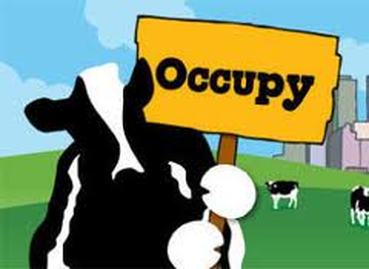
Inclusivity is intrinsic to Occupy Wall Street's principles. Unlike a politician who pushes their own agenda. OWS works collaboratively within working groups to come to consensus to build an agenda. Demonstrators in NYC's Zuccotti Park participate in these sessions vetting all the issues presented in order to create an strategic plan of action. By building consensus, the General Assembly can be sure that they are inclusive of everyone's voice. In other words, they are shaping a democracy. Sound familiar? Watch out OWS! History has shown it could be a slippery slope! The movement has received respect for how well it has organized itself but received low marks for not being clear on its demands. There is contention within the OWS on how to reach these demands, straight consensus or 2/3 majority? We'll have to wait and see. Perhaps OWS is slow to deliver because they encompass more than just a few bullet points but rather a new decision making process altogether.
Running parallel to Occupy Wall Street are the injustices in the food system. It is easy to see how the two movements are connected. In drastic comparison to the 1%, are the one in five Americans on food stamps. A few powerful corporations dominate the food industry as wells as the government which is intended to control them. And food is traded on Wall Street as a commodity making it vulnerable to market fluctuations. In recent years, grain prices increased and had a ripple effect around the world. Good for farmers, bad for people. Then when the prices drop, the farmers are the at the other end. Some say that Wall Street is responsible. Looking for a new investments after the housing bubble, financial institutions capitalized on the looser regulations governing the trade of agricultural commodities. Hoping to make a quick buck, Wall Street gambled with our food.
The Occupy Wall Street demonstration has the critical mass to bring the food movement into the social movement spotlight.

 RSS Feed
RSS Feed
